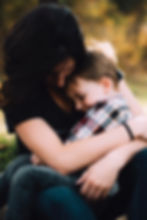Articles about grieving
Finding the Right Words: Guidelines on how to talk to grieving children about death
Helping Children and Teenagers
Through the years I have learned a great deal from many grieving children and their families. They have taught me which words work best when talking to children about death. Here are some general concepts I suggest companions use when talking with children about death, dying, grief, and mourning.
You Must Make Friends with the Darkness Before You Can Enter the Light
Helping Yourself with Grief
One way in which we used to honor the need to make friends with the darkness of grief was to observe a period of mourning. During this time—whose length and detailed customs varied by era, religion, and culture as well as by each mourner’s specific relationship to the person who died—mourners essentially withdrew from society. When they did venture out into the community, they wore clothing that outwardly represented their internal reality.
Helping Yourself Heal When Someone You Care About Dies of a Drug Overdose
Helping Yourself with Grief
A friend or family member has died of a drug overdose. Death and grief are always hard, but when someone dies from drug use, understanding your feelings and knowing what to think and say about the death can be especially difficult. This article offers compassionate guidance for coping with your own grief as well as helping others affected by the loss.
Helping Yourself Heal When an Adult Sibling Dies
Helping Yourself with Grief
Your brother or sister has died. I am truly sorry for your loss.
Whether your sibling was younger or older, whether the death was sudden or anticipated, whether you were very close to your sibling throughout your lives or experienced periods of separation, you are now grieving.
The importance of support while grieving
Helping Yourself with Grief
Most people don’t talk much about death and dying. There are so many other things that we would rather focus on in life, so when we are confronted with death, many of us find we do not know how to address loss and the feelings that come with it.
Helping a Grandparent Who is Grieving
Helping Others with Grief
A child or young adult has died. Everyone who loved the child is now faced with mourning this tragic, untimely death. The child's parents are heartbroken. But what about the grandparents? How might they be feeling? How can you help them with their unique grief?
Helping Children Cope With Grief
Helping Children and Teenagers
Adults grieve. So do children. As an adult or child, experiencing grief means to "feel," not just to "understand." Anyone old enough to love is old enough to grieve. Even before children are able to talk, they grieve when someone loved dies. And these feelings about the death become a part of their lives forever.
Why Choose A Final Resting Place for Your Loved One
Helping Yourself with Grief
When a loved one dies, many important decisions must be made. How the person’s body will be cared for and where it will be placed are among these decisions. Especially if you have chosen cremation, this article will help your family understand the many benefits of choosing a final resting place for your loved one.
Helping Yourself Heal When Your Parent Dies
Helping Yourself with Grief
Your mother or father has died. Whether you had a good, bad or indifferent relationship with the parent who died, your feelings for him or her were probably quite strong. At bottom, most of us love our parents deeply. And they love us with the most unconditional love that imperfect human beings can summons.
Helping Your Family When a Member is Dying
Helping Others with Grief
Learning that someone in your family is dying is a blow to everyone the news touches. We sometimes think this only happens in other families, but now it is happening to yours. If the onset of the illness was sudden or unexpected, you and the rest of your family will likely feel shock and numbness at first. This is a natural and necessary response to painful news.
Helping Teenagers Cope with Grief
Helping Children and Teenagers
Each year thousands of teenagers experience the death of someone they love. When a parent, sibling, friend or relative dies, teens feel the overwhelming loss of a someone who helped shape their fragile self-identities. And these feelings about the death become a part of their lives forever.
The Misconception of the Funeral as a Rite of Closure
Helping Others with Grief
It’s a common misconception. When someone we love dies, the death indeed ends—forever—our experience of live, bodily presence with that person. The body is dead. It’s true—something essential is finished. It is over. A door has closed.
Helping Children with Funerals
Helping Children and Teenagers
One of the first opportunities for you and the child to express your grief is the funeral. This article will help you understand the importance of the funeral not only for you and other adult mourners, but for the children. It will also offer suggestions for guiding children through this important ritual in a healthy, life-affirming way.
Navigating Farewell: Essential Questions When Planning a Funeral
Helping Yourself with Grief
A funeral is not only a way to honor and celebrate a life but also a means of finding closure and support during a difficult time. To help guide you through this journey, here are ten crucial questions to ask when planning a funera
The Teeter-Totter of Resilience and Vulnerability in Grief
Helping Yourself with Grief
As you journey through your grief, you are probably being buoyed by—and perhaps also dismayed by—your natural resilience. After all, here you are. You may not have thought it possible at first, but you have indeed survived.
Will I Befriend My Feelings Or Will I Deny, Repress, Or Inhibit Them?
Helping Yourself with Grief
Your feelings are the way you perceive yourself. They allow you to respond to the world around you and help you know you are alive. If you shut them down—if you deny, repress, or inhibit them—you risk being among the “living dead.” If you lose touch with your feelings, you have no true awareness of life.
Top 10 Considerations for Preplanning Your Funeral Arrangements
Helping Others with Grief, Helping Yourself with Grief
When considering the future, one of the kindest things we can do for our families is to preplan our funeral arrangements. This thoughtful preparation can alleviate the burden on loved ones during a difficult time. Here’s a guide to the top ten considerations to keep in mind when preplanning your funeral.
When Your Soulmate Dies
Helping Yourself with Grief
Grief is everything we think and feel inside after someone or something we care about is taken away from us. Grief can be sadness. Grief can be anger. Grief can be shock and regret and confusion. Grief can be these and many other possible emotions and thoughts. When we are grieving, precisely which mixture of emotions and thoughts we have inside of us changes from moment to moment and day to day.
Helping Your Family Heal After Miscarriage
Helping Others with Grief
It is normal and natural to hurt deeply after a miscarriage. While others may imply or outright tell you that miscarriage happens too early on for you to be attached to the baby, or that miscarriage is so common it’s nothing to get upset about, or that you should focus on getting pregnant again instead of being sad about what happened, you know that miscarriage and ectopic pregnancy often feel like profound losses.
Helping a Grieving Friend in the Workplace
Helping Others with Grief
Our support of a fellow employee can make a real difference in how he survives right now. Being present to a co-worker in grief means you are giving one of life's most precious gifts-yourself. Do not underestimate how your efforts to help can make a real difference for him. Your supportive presence, particularly when he is just returning to work and in the weeks and months ahead, can make an important difference in how your coworker heals.
Helping a Suicide Survivor Heal
Helping Others with Grief
Because of the social stigma surrounding suicide, survivors feel the pain of the loss, yet may not know how, or where, or if, they should express it. Yet, the only way to heal is to mourn. Just like other bereaved persons grieving the loss of someone loved, suicide survivors need to talk, to cry, sometimes to scream, in order to heal.
Helping Yourself Heal When Someone Loved Dies
Helping Yourself with Grief
You are now faced with the difficult, but important, need to mourn. Mourning is the open expression of your thoughts and feelings regarding the death and the person who has died. It is an essential part of healing. You are beginning a journey that is often frightening, painful, overwhelming, and sometimes lonely.
Embracing Hope: Philosophies of Death that Celebrate Life
Helping Yourself with Grief
Death, an inevitable part of the human experience, has been a subject of contemplation and reflection throughout history. While it is often associated with grief and sadness, many philosophers and theologians have offered profound insights that provide solace to mourners, inspire hope and optimism, and celebrate the beauty of life.

































